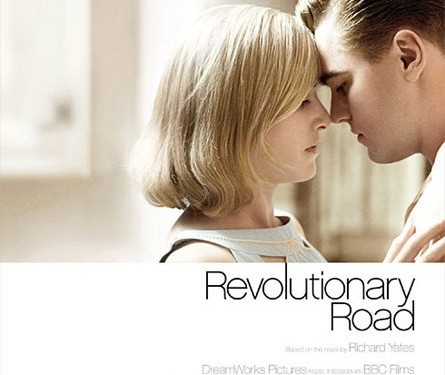Revolutionary Road
06.2.2009 | By Alex Florez |
Rated: R for language and some sexual content/nudity.
Release Date: 2008-12-26
Starring: Justin Haythe, Richard Yates
Director(s):
Distributor:
Film Genre:
Country:EE.UU, Reino Unido
Official Website: http://www.revolutionaryroadmovie.com/
Revolutionary Road is the dissection of an imploding marriage and a contemplation about life in surburbia. It’s a sad, grim movie that asks pointed questions about the compromises we make and the lies we tell in an effort to maintain a sense of equilibrium. And is it more courageous to face up to one’s responsibilities or to follow a dream, no matter how impossible it may seem?
It’s western Connecticut in 1955. Frank Wheeler (Leonardo DiCaprio) and his wife, April (Kate Winslet), are entering a dark period in their marriage. Communication between them has broken down and Frank has begun to stray with a co-worker (Zoe Kazan). He’s not happy with his job; he hates the work but needs the money to support April and his two children. Then, on his birthday, April presents Frank with a plan: sell their cozy house on Revolutionary Road and move to Paris. There, after leaving behind the “hopeless emptiness” of their current life, they can begin anew. April can work while Frank takes some time for self-discovery. He is initially enthused by the idea, but reality begins to intrude on the fantasy. Frank is offered a major promotion, and with it comes more money and more responsibility, and April learns that she is pregnant with the couple’s third child. Suddenly, Paris seems like a fairy tale and the union that had been buoyed by a spark of elusive hope, crashes and burns.
Â
A lot of marriages are like this, with many of the fundamental problems not having changed in 50 years. Too many unions begun with hope and optimism degenerate into stale existences with two disconnected individuals living under the same roof. Today, many such couples divorce. In 1955, divorce was less common, so husbands and wives would argue and find ways to make temporary peace. It’s unfair to claim that the happy suburban family was (or is) an illusion, but the reality is not as perfect as the illusion. There are challenges to be overcome, one of the most prominent of which is the battle between following a dream and bringing home a healthy income. In the Wheelers’ marriage, Frank is the pragmatist and April is the dreamer. Their most searing conflicts are born out of the inherent opposition of those two natures.
Watching DiCaprio and Winslet, it’s hard to remember that these were the star-crossed lovers in Titanic. Their on-screen relationship here is more real and brittle – not the kind of marriage some viewers would hope for from Rose and Jack. The actors use their chemistry (they are great friends) to forge an underlying sense of affection between Frank and April, but the fractures are deep and widening. These are believable, flawed people and, as in situations like this, fault can be generously apportioned. It’s possible to understand both sides. Assigning blame is as difficult as determining the solution. Winslet’s performance is more emotive than DiCaprio’s, but that’s because of the nature of her character. Both portrayals are credible and, while Winslet’s performance in The Reader is probably more likely to gain Oscar consideration than her work as April, it seems unfair to single out one over the other.
Revolutionary Road is dramatically potent material and, although it poses a number of philosophical questions, it works best as an unsentimental examination of a marriage in crisis. Because the actors are expert, Mendes understands the subject matter, and the source material is so meticulous, we are left emotionally impacted but without a sense of having been manipulated. Revolutionary Road is a fine motion picture, but it’s not a good choice to lighten a burden or brighten a night. It rewards in the ways that only tragedies can.


































